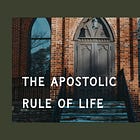Welcome to the 13th Week of Ordinary Time!
Today we’re kicking off the Apostolic Rule of Life project with the Preface. As the final document is intended to be a communal Rule of Life, I’ve decided to call it “The Disciple’s Agreement.” It will be structured as an agreement for community life that small groups can use as a baseline for their life together.
You can learn more about the background to this project here!
Preface
What is a “disciple” exactly? For such a frequently used word, it’s not one frequently considered.
Its simplest definition is the one we find in the New Testament: someone who follows Jesus. Disciple comes from the Greek word μαθητής (mathetes) and was used to describe someone who followed a teacher, usually in an apprenticeship relationship.
So if being a disciple means being a follower (apprentice) of Jesus, what does a follower do? What are the kinds of things Jesus is teaching us and how do we learn them? If an apprenticeship is meant to cover both theoretical and practical knowledge, what does it look like when our Master isn’t physically present to us in the same way other teachers are to their followers?
In the Roman Catholic stream of the Church, we have developed incredible discipleship theory, from Catechisms to Apostolic Exhortations to Council documents. This great intellectual (and philosophical, doctrinal, moral etc.) tradition is an incredible asset to those of us who call ourselves followers of Jesus. That said, there is one glaring issue.
The Church Universal, in her wisdom, rarely prescribes practicals that all of us must adhere to. Far more often she offers foundations (moral law, Catholic Social Teaching, dogmas etc) from which the practicals and particulars are to be derived. This allows local communities to take these foundations and apply them to their own contexts. The issue occurs when this contextualization does not happen and, with some notable exceptions, it usually doesn’t.
The problem compounds when we consider the radical individualism of the modern West. Good, faithful Catholics who want to be apprentices of Jesus and live out that apprenticeship under the direction of the Church lack clear direction, and so we end up with a kind of individualistic, personalistic faith.
This is not how Jesus intended our discipleship to go. His salvation and apprenticeship are not strictly one on one but communal. Lumen Gentium says beautifully “God… does not make men holy and save them merely as individuals, without bond or link between one another. Rather has it pleased Him to bring men together as one people, a people which acknowledges Him in truth and serves Him in holiness.” (LG 9).
The task then, while it cannot be said to be easy, is at least simple. We need something, anything that can contextualize the path of discipleship and the instructions of our Church, not just for individuals but for communities.
This document is one attempt. It’s been structured as an agreement for community life. It’s a clear spelling-out of how individuals should live in community and what kind of culture a community must create for its members to thrive. This agreement is attempting to cast a vision for doing what every group of committed Christians throughout history has done - to live as Jesus did with His disciples in our own time and in our own way.
This agreement is neither exhaustive nor universal; in other words, it doesn’t cover everything and it will not try to. It’s intended to give a framework, a baseline for how disciples should live alongside one another in a way that brings about deeper intimacy with Christ and the fruits of the Holy Spirit.
It cannot be overstated that the end goal of this undertaking is nothing less than complete and total union with God. As Christians in the modern West, many of us have done ourselves a disservice by setting our expectations for discipleship too low. It’s not about living a happy life (though it doesn’t preclude one), having fulfilling relationships (as necessary as they are), or even the altruistic goals of evangelization and justice. The end goal of the Christian life is theosis, divinization, or participation in the inner life of the Holy Trinity.
To be a disciple is no small task. Jesus Himself told us that whoever wanted to be one would have to take up their cross daily, an instrument of torture and death. The hope we find in Him is that on the other side of that cross is Resurrection. He was the first to walk out of the grave but we can be confident in knowing that if we follow Him, we’ll find ourselves walking out too.
That’s all for this issue! We’ll be back very soon to share a framework for understanding transformation.





